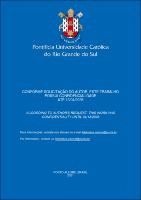| Share record |


|
Please use this identifier to cite or link to this item:
https://tede2.pucrs.br/tede2/handle/tede/9532| Document type: | Tese |
| Title: | Um novo IVA? : adaptações do Imposto sobre Valor Agregado para a economia digital |
| Author: | Castello, Melissa Guimarães  |
| Advisor: | Silveira, Paulo Antonio Caliendo Velloso da |
| Abstract (native): | A tese tem por problema central analisar a necessidade de adaptação do Imposto sobre Valor Agregado, tal qual ele está formatado hoje, para incidir sobre os arranjos de consumo da economia digital. Para tanto, aborda-se os princípios estruturantes e o funcionamento do IVA (com análise do IVA europeu e do ICMS brasileiro), estudando esta técnica de tributação a partir da teoria da regra matriz de incidência tributária, desenvolvida por Paulo de Barros Carvalho. Em seguida, passa-se à delimitação do que se entende por arranjos de consumo da economia digital, examinando estes novos modelos de negócios à luz da teoria de Schumpeter. Por fim, passa-se ao exame das necessárias adaptações do IVA à economia digital. Conclui-se que, devido às alterações dos arranjos de consumo no século XXI, o IVA deve passar por modificações na sua estrutura. Em especial, deve ser formulado um IVA com critério material definido de forma ampla – “realizar operações com valor agregado” – e exigido no destino. Também devem ser feitos ajustes no critério espacial e na responsabilização de terceiros pela arrecadação do imposto, para garantir a adequada cobrança nas operações internacionais ou internas a mercados integrados. |
| Abstract (english): | The thesis focuses on the analysis of the suitability of Value Added Tax, with its present characteristics, to the digital economy. To this end, the structuring principles and the functioning of VAT are accessed (with emphasis on the European VAT and the Brazilian ICMS). This study uses the theory developed by Paulo de Barros Carvalho to identify the main elements of a VAT. Then, we move on to define what is meant by consumption arrangements of the digital economy, examining these new business models in the light of Schumpeter's theory. Finally, the adaptations of VAT to the digital economy are examined. One concludes that, due to changes in the consumption arrangements of the 21st Century, VAT should undergo changes in its structure. In particular, a VAT must be formulated with a broad tax base - “carrying out any operation with value added” - and it should follow the destination principle. There must also be adjustments in the cross border liability, establishing new responsibilities for collecting the tax. Thus, the adequate collection in international or regional operations will be secured. |
| Keywords: | Imposto sobre Valor Agregado Comércio Eletrônico Economia Digital ICMS ISS IBS Value Added Tax E-commerce Digital Economy ICMS ISS GST |
| CNPQ Knowledge Areas: | CIENCIAS SOCIAIS APLICADAS::DIREITO |
| Language: | por |
| Country: | Brasil |
| Publisher: | Pontifícia Universidade Católica do Rio Grande do Sul |
| Institution Acronym: | PUCRS |
| Department: | Escola de Direito |
| Program: | Programa de Pós-Graduação em Direito |
| Access type: | Acesso Aberto |
| Fulltext access restriction: | Trabalho será publicado como artigo ou livro |
| Time to release fulltext: | 60 meses |
| Date to release fulltext: | 13/04/2026 |
| URI: | http://tede2.pucrs.br/tede2/handle/tede/9532 |
| Issue Date: | 26-Feb-2021 |
| Appears in Collections: | Programa de Pós-Graduação em Direito |
Files in This Item:
| File | Description | Size | Format | |
|---|---|---|---|---|
| TES_MELISSA_GUIMARAES_CASTELLO_CONFIDENCIAL.pdf | MELISSA_GUIMARES_CASTELLO_TES | 573.95 kB | Adobe PDF |  Download/Open Preview |
Items in DSpace are protected by copyright, with all rights reserved, unless otherwise indicated.




